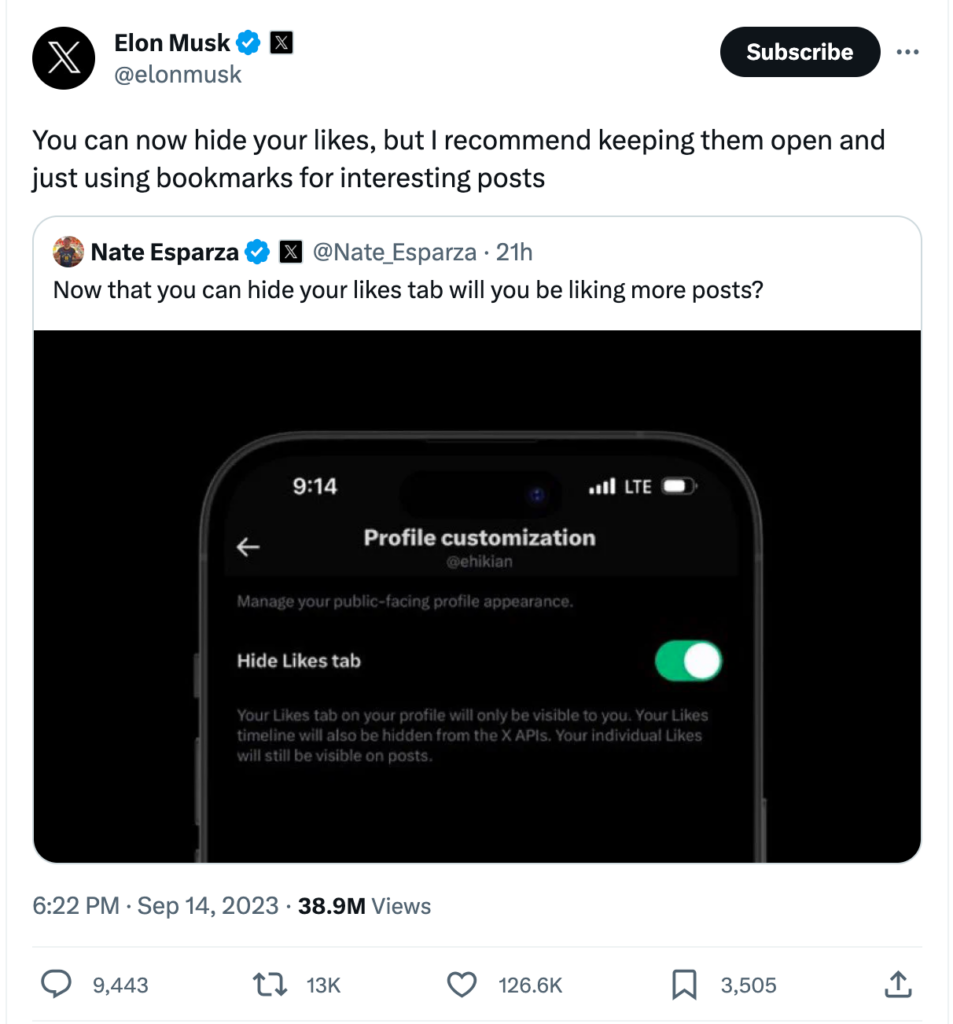
Source: Shutterstock.
The latest changes at X – including a new privacy policy
Updates to users’ privacy on X are the latest in the slew of changes Elon Musk has brough to the site formerly known as Twitter.
X plans to collect biometric data on its users, in an update to its privacy policy.

The new name and logo of Musk’s social media site.
Biometric data is a broad term for any data relating to a person’s physical or behavioural characteristics including, for example, facial scanning technology. Under X’s new policy (section 1.1), which is due to come into effect on the 29th of September, the platform “may collect and use your biometric information for safety, security, and identification purposes.” The policy states that this is “based on your consent”, which suggests that users may be able to opt out.
The news follows a proposed class-action lawsuit in the US state of Illinois this July, which alleged that X violated the Illinois Biometric Information Privacy Act (BIPA) by wrongfully capturing, storing and using the biometric data of Illinois residents without their consent.
Although the incoming policy does not define what X considers ‘biometric information’, the company provided some clarity in a recent statement to the BBC:
“X will give [users] the option to provide their government ID, combined with a selfie, to add a verification layer. Biometric data may be extracted from both the government ID and the selfie image for matching purposes. This will additionally help us tie, for those that choose, an account to a real person by processing their government-issued ID. This will also help X fight impersonation attempts and make the platform more secure.”
It’s speculated that this decision may also help to enable passwordless sign-ins. According to findings in the app’s code it appears that X plans to support passkeys, which create a secure link between a user’s device and a website or app. Passkey-supported apps enable users to log in to their account using their device’s fingerprint scanner, facial recognition, or PIN.
In addition to biometric information, X’s new privacy policy states that it “may collect and use your personal information (such as your employment history, employment preferences, skills and abilities, job search activity and engagement, and so on) to recommend potential jobs for you, to share with potential employers when you apply for a job, to enable employers to find potential candidates, and to show you more relevant advertising.”
According to reports, X Corp – Twitter’s parent company – acquired a tech recruiting service called Laskie in May, and there has been speculation that X may want to offer recruitment services in future. This would be unsurprising given that Elon Musk, who acquired Twitter in 2022 for USD$44bn, has previously stated that he hopes to turn X into an “everything app” à la China’s hugely popular WeChat.

Changes to privacy on X seem more focused at hiding from other users – not the site and third parties.
The updated privacy policy is not the only major policy change taking place at Twitter/X. The company also announced in a statement released August 29th that it will start accepting all political advertisements again, beginning in the US.
Twitter banned all political ads globally in October 2019 amid concerns surrounding misinformation on the platform. At the time, then-CEO Jack Dorsey said of the decision: “We believe political message reach should be earned, not bought”, adding that paid political advertising “has significant ramifications that today’s democratic infrastructure may not be prepared to handle.”
Following Musk’s takeover, the platform relaxed the policy this January to allow “cause-based ads” in the US, including ads that raise awareness of issues such as climate change, voter registration, and government programs.
X’s statement says this move will build on their “commitment to free expression”, but the decision to allow all political ads in the United States will likely give the company a financial boost too: its ad revenues have plummeted by about 50% since Musk took over, amid concerns from advertisers that their ads could appear next to problematic content.
Another recent attempt to reverse the revenue decline came in the form of Twitter Blue, a paid subscription service introduced this April, which charges users $8 a month to retain verified (‘blue tick’) status. The initiative was followed by a wave of imposter accounts sharing harmful misinformation, and many organizations and companies either stopped using Twitter or paused Twitter ads as a result.
Twitter Blue was described by Insider Intelligence as “a mess” that created “more chaos and confusion for brands” who were already feeling vulnerable on the platform.
X says that it will create a global advertising transparency center, which will enable users to see what political ads are being promoted on the platform. It additionally promises to implement robust screening processes to ensure “only eligible groups and campaigns” can purchase advertisements.
“Starting in the U.S., we’ll continue to apply specific policies to paid-for promoted political posts,” the statement reads. “This will include prohibiting the promotion of false or misleading content, including false or misleading information intended to undermine public confidence in an election, while seeking to preserve free and open political discourse.” This is in line with X’s updated enforcement policy, ‘Freedom of Speech, Not Reach’, which aims to limit the visibility of posts that violate their policies rather than removing them.
READ MORE
- Safer Automation: How Sophic and Firmus Succeeded in Malaysia with MDEC’s Support
- Privilege granted, not gained: Intelligent authorization for enhanced infrastructure productivity
- Low-Code produces the Proof-of-Possibilities
- New Wearables Enable Staff to Work Faster and Safer
- Experts weigh in on Oracle’s departure from adland
